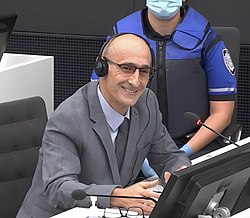Salih Mustafa | |
|---|---|
 Salih Mustafa during the Kosovo Special Court (2020) | |
| Nickname | Commander Cali |
| Born | 1 January 1972 |
| Allegiance | |
| Branch | National Movement for the Liberation of Kosovo [1] Kosovo Liberation Army Kosovo Protection Corps Kosovo Security Force |
| Years of service | Before 1993 (NMLK), 1993–1999 (KLA), 1999–2020 (KPC/KSF) |
| Rank | Commander |
| Unit | Guerilla BIA |
| Battles / wars | Kosovo War * Battle of Marec |
| Criminal information | |
| Criminal charge | War crimes of arbitrary detention, cruel treatment, torture, and murder |
| Penalty | 15 years of imprisonment |
Salih Mustafa also known by the nickname "Cali", (born 1 January 1972) is a former Kosovo Albanian war commander of the Kosovo Liberation Army (KLA) from the Guerilla BIA unit, which operated in the Llap region operative zone, particularly in parts of Gollak, Zllash during the Kosovo War. He was the former founder and Leader of the Nationalist Communist Party National Movement for the Liberation of Kosovo and the former intelligence chief of the Kosovo Security Force (KSF) until his indictment in The Hague. [2] In 2022, he was convicted of war crimes in Kosovo Special Court and eventually sentenced to a total of 15 years of imprisonment.